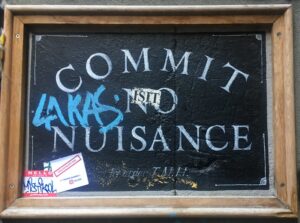Nuisances come in many forms. From a branch overhanging into a neighbor’s property to raucous house parties, nuisance reports are a common subject of domestic conflict. By understanding nuisance law better, a property owner can help to protect themselves from becoming the subject of a report or understand their rights if a property owner wants to file a nuisance complaint themselves.
Minnesota state statute and local nuisance ordinances set forth both what is considered a nuisance and what process the state must go through to fine the property owner for the nuisance or abate (remove) the nuisance without the property owner’s consent.

What is a nuisance?
A nuisance is defined by the body that enacts the rule forbidding the nuisance. These rules are broadly written and encompass a wide swath of activity from drug use to a violation of the Fire Code. Generally, a nuisance only becomes an issue for a property owner when reported to the city or to law enforcement. Under Minnesota statute, a person can even be arrested for creating a nuisance in some circumstances.
It is important to know that if a person is a victim of stalking or harassment, or if the victim and aggressor are family/household members, the victim cannot be held responsible for a nuisance caused by the aggressor on their property.
Private v. Public Nuisance
The law separately classifies nuisances that generally impact a whole community and nuisances that impact one specific person into public and private nuisances. For example, a person would be committing a private nuisance if they were dumping totaled cars in their neighbor’s yard. A person would be liable for a public nuisance if they were dumping totaled cars in a public park.
A private nuisance action must be filed in court by the person alleging they are being harmed by the private nuisance. When a public nuisance occurs, state and local governments take action on behalf of those impacted instead of a private party taking the action to court.
State Public Nuisance Laws
In general, Minnesota’s public nuisance law defines “nuisance activity” to include either one behavioral incident or two separate behavioral incidents committed within a building or on a property within the previous 12 months. One incident of any of the following activities is sufficient to constitute a public nuisance:
-prostitution or prostitution-related activity.
-unlawful activity involving controlled substances (drugs).
-unlawful use of a dangerous weapon.
-providing alcohol to more than one person under 21 or selling liquor without a license when the building is not occupied by the owner or tenant.
Alternatively, two or more incidents involving any one or a combination of the following activities constitute a public nuisance:
-gambling or gambling-related activity.
-unlicensed sales of alcoholic beverages.
-unlawful furnishing of alcoholic beverages to a person under age 21.
-maintaining or permitting a condition that unreasonably annoys, injures, or endangers the safety, health, morals, or repose of any considerable number of members of the public.
-engaging in any other activity declared by law to be a public nuisance.
-the violation by any commercial enterprise of a local nuisance ordinance or regulation prohibiting the maintenance of a public nuisance.
-permitting real property to be used to maintain a public nuisance, or renting the property knowing it will be used to maintain a public nuisance, by whoever maintains control of the property.
Local Public Nuisance Ordinances
Local units of government also have the authority to define and abate nuisances by means of local ordinance. This power is granted to cities through the legislature. Local nuisance ordinances generally cover more property related issues and less behavior-oriented issues.
The nuisance ordinance permits the city to abate a wide variety of property nuisances, including anything or condition on a property that is a fire hazard, a violation of the Fire Code, a health hazard, a violation of any health or sanitation law, or any other type of hazard. While some nuisances are considered obvious safety hazards, there are others that are more debatable. For example, it can be argued that a flat tire on a vehicle located on private property can be enough to render it “undrivable” and therefore a “nuisance.”
What to do about a nuisance?
If the nuisance is an activity, a court case will be brought asking for an “injunction,” or a legal order commanding the activity to stop. Additionally, if the nuisance is a violation of the noise ordinance or a similar ordinance, the person might be fined for their violation of the ordinance. If the nuisance is a property issue, like an overhanging tree or a broken-down vehicle, the nuisance will be “abated,” or removed, with the bill for however much it cost to remove the nuisance sent to the property owner.
The good news is that a property owner gets a warning before the nuisance is abated. If an action is brought under a state nuisance law, if the owner either abates (ends) the nuisance activity or enters into an abatement plan with the prosecuting attorney within 30 days of receiving the written notice, the prosecutor may not file the nuisance action with the court. However, if the owner fails to act within this time period or fails to comply with the abatement plan, the prosecuting attorney may file the nuisance action. If the action is brought under a local nuisance ordinance, the rules of the local ordinance apply. These rules are different in every city, but in Saint Paul, only seven days’ notice is given to provide time for compliance with the nuisance ordinance or to appeal the abatement before abatement occurs.
We’re Available 24/7 – Get help with your nuisance action today.
Contact John Lesch today if you are dealing with a nuisance issue. The consequences of housing an alleged nuisance on your property, or the constant struggle of dealing with a nuisance, can be stressful and costly. An experienced attorney will be able to understand the intricacies involved in both state, local and private nuisance actions and will be able to find the best resolution for your case.


